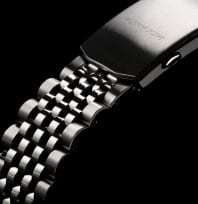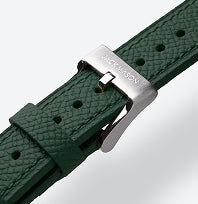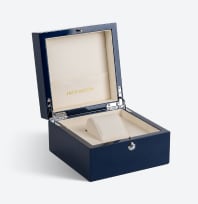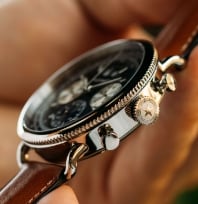Every man needs a quality watch, but how exactly do these popular accessories function?
Understanding The Mind-Blowing Mechanics Behind Your Watch
An analog watch isn’t just a stylish accessory – it’s also an incredible example of human ingenuity. The technology used to power a watch and keep it accurate is a mystery to many, but here, you’ll learn what is going on under the surface that makes your watch tick.
In addition, you will learn the key differences between the different types of movement used to power watches, as well as how to determine which one is best for you.
Understanding Quartz Watches
One of the primary types of mechanisms that can be used to power watches is quartz movement. A quartz watch is powered by a battery, which sends an electric current through a piece of quartz. This signal causes the hands of the watch to move at a consistent speed, keeping the watch accurate.
Quartz watches are a more recent invention, initially created by the notable Japanese watchmaker Seiko in the mid-late 20th century. Quartz watches have become well known for numerous reasons, but especially for their durability. Watches powered by quartz movement do not have as many moving parts that have the potential to break down and need repair.
In general, luxury watches are typically not powered with quartz movement. This is primarily because luxury watchmakers tend to favor mechanical movement, which is considered by many to be an art form due to the intricacies of each mechanical watch.
However, a quartz watch is not necessarily inferior in quality to a mechanical watch. Mechanical watches are often favored for the sake of tradition and out of an appreciation for the ingenuity behind their design. On the other hand, quartz watches tend to be easier to maintain and are often more affordable than their mechanical counterparts.
Quartz Watches: The Pros
If you choose to wear a quartz watch, you can count on it being one of the most low-maintenance timekeeping devices you can own. While a mechanical watch needs to be routinely wound to keep it accurate, a quartz watch will give you the correct time consistently without any need for maintenance or intervention. This ease of use is possible thanks to the use of a battery as opposed to a wide array of interconnected components.
In addition, quartz watches tend to cost significantly less than mechanical ones. The level of time, materials, and effort needed to assemble a mechanical or automatic watch is greater than that of a quartz watch, and thus quartz watches are priced more affordably.
Mechanical watches, in particular, can often run for thousands of dollars due to their status as luxury or collectors’ items. In contrast, a quartz watch can offer you the same level of quality with less of an investment required in terms of both money and maintenance.
Another major selling point for quartz watches is the ability to confidently wear your watch on a regular basis without worrying as much about it getting lost or stolen. Luxury watches, often powered by mechanical movement, are extremely valuable, and wearing one on a daily basis can leave you anxiety-ridden due to the burden of carrying something so expensive everywhere you go.
In contrast, you can easily wear a quartz watch on a day-to-day basis, leveling up your style and presentation without worries about damaging it, misplacing it, or having it stolen.
The case for quartz watches is strong. They tend to be easier on your wallet, better for everyday use, and much easier to maintain. A mechanical watch is often more of a collectors’ item than a staple accessory for daily wear. If you are looking for a versatile, low-maintenance, and lower-cost watch, opt for one powered by quartz movement.
Understanding Automatic Watches
Automatic watches are a subcategory of mechanical watches. Unlike quartz watches, automatic watches are not powered by batteries. Instead, an automatic watch transfers energy from the wearer’s wrist into a weighted rotor within the watch, allowing the watch’s hands to move without power from a battery.
Wearing an automatic watch regularly will keep it working since the wearer’s wrist’s movement allows for energy to be stored in the watch’s mainspring. After some time without wearing an automatic watch, the watch will need to be wound to work.
Automatic Watches: The Pros
One of the primary reasons automatic watches are favored by those who wear them is the association mechanical watches have with luxury. Whether a mechanical watch is manual or automatic, it will often be priced higher than a quartz watch due to the intricacy of its components and the effort required for assembly. This means that an automatic watch can be something of a status symbol.
In addition, automatic watches tend to have a distinct weight to them, which can lead to a pleasant handling and wearing experience. The components inside the watch are typically heavier than those inside of a manual or quartz watch, giving it a weight that often is indicative of the watch’s quality.
Automatic Watches: The Cons
Because an automatic watch is mechanical, it requires more maintenance than a quartz watch. Although automatic watches are designed to be powered by the motion of the wearer’s wrist, prolonged time without wearing will require the owner to wind the watch manually.
If you plan on wearing your watch daily, this may not be as much of a concern for you. However, it is definitely something to consider, especially when you are looking for a watch that will work well with minimum need for upkeep.
In addition, automatic watches tend to ride at a higher price point than quartz watches. The luxury associations with mechanical watches, whether automatic or manual, mean that some automatic watches can cost thousands of dollars.
For hardcore watch enthusiasts and collectors, purchasing a watch that costs this much may be on the table, but for most, it’s out of the question. In addition, it can be hard to wear something as expensive as a car without constantly worrying about it getting damaged, going missing or getting stolen.
The weight of an automatic watch can be appealing to some, but it also means your wrist may feel over-encumbered while wearing the watch. This ultimately comes down to personal preference, but a quartz watch will typically feel lighter on your wrist. While the weight of an automatic watch is often an indicator that it has been made well, there is not an inherent quality gap between quartz movement and automatic movement. In fact, a case can be made for quartz-powered watches being superior because of their convenience, accessibility, and low-maintenance design.
Which Is Better?
Ultimately, it’s up to you to decide which type of watch best suits you based on your preferences, budget, and level of interest in watches in general.
Luxury mechanical watches tend to only be a viable option for diehard enthusiasts and collectors and are less suitable for daily use. A quartz watch is a great option when you are looking for something practical and reasonably priced but don’t want to compromise on quality.
Knowing Which Watch Is Best For You
If you opt for a quartz watch, you still have plenty of choices beyond that. There are a wide variety of types of watches that can be found powered by the different types of watch movements.
It can be confusing to differentiate between a watch movement and a type of watch at first. However, the distinction is relatively simple: any type of watch can be powered by any type of movement. For example, you can wear an automatic dive watch or a quartz racing watch, and so on. A watch’s movement is independent of its type.
Choosing which type of watch is best for you is dependent on your lifestyle, personal fashion preferences, and any extra functions that might be helpful to have present on your watch. Any function on your watch besides its ability to tell time is called a complication.
For example, some field watches have a date display complication, and racing, aviation, and nautical watches have chronometers. Complications change the look and feel of a watch and can add additional functionality and convenience for the wearer.
In some circumstances, a watch with minimal complications looks best. This is especially true when you are wearing a formal outfit, which tends to look best with a dress watch or dive watch, both of which tend to have few or no complications.
A good quartz watch will last you a long time, stay accurate without maintenance or upkeep, and level up your style immensely. The type of watch that you choose is up to you, and there are plenty of options that can complement a wide variety of looks and styles.
Exploring the different types of watches out there is extremely interesting and is enough to turn anyone into a diehard watch enthusiast – a great hobby to have, without a doubt.
Sources:
https://www.nytimes.com/2019/02/20/fashion/watches-unesco-craft-protection.html
https://www.physlink.com/education/askexperts/ae559.cfm
https://www.bloomberg.com/news/articles/2017-11-16/a-concise-history-of-the-quartz-watch-revolution












